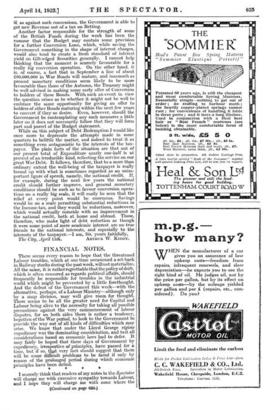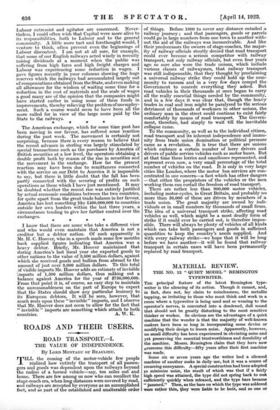FINANCIAL NOTES.
There seems every reason to hope that the threatened Labour troubles, which at one time occasioned a set-back in Railway stocks during the past week, will not materialize. All the same, it is ratherregrettable that the,policy of drift. which is often censured as regards political affairs, should frequently be responsible for troubles in the industrial world which might be prevented by a little forethought. And the defeat of the Government this week—with the alternative, perhaps, of a Labour Ministry—although only by a snap division, may well give room for thought. There seems to be all the greater need for Capital and Labour being alive to the necessity for taking all possible precautions against the very commencement of labour disputes, for on both sides there is rather a tendency, begotten of the War period, to look to the Government to provide the way out of all kinds of difficulties which may arise. We know that under the Lloyd George regime expediency was the dominating consideration, and to it all considerations based on economic laws had to defer. It may fairly be hoped that these days of Government by 'expediency, irrespective of principles, have passed for a time, but if so, thkit very fact should suggest that there 'will be some difficult problems to be faced if only by reason of the prolonged period during which economic principles have been defied.
I scarcely think that readers of my notes in the Spectator will charge me with excessive .sympathy towards Labour, and I .hOpe they will charge _me with none where the (Continued on page 080.) , Labour extremist and agitator are concerned. Never- theless, I could often wish that Capital were more alive to its responsibilities, both to Labour and to the general community. A little more tact and forethought would, I venture to think, often prevent even the beginnings of Labour discontent. I am not at all sure, for example, that some of our English railways acted wisely in recently raising dividends at a moment when the public was suffering from high fares and high freight charges and Labour was experiencing some reduction in wages. I gave figures recently in your columns showing the huge reserves which the railways had accumulated largely out of compensations obtained from the State, and even making all allowance for the wisdom of waiting some time for a reduction in the cost of materials and the scale of wages a good many are of the opinion that the companies might have started earlier in using some of these funds in improvements, thereby relieving the problem of unemploy- ment. Such • a course would seem to have been all the more called for in view of the large sums paid by the State to the railways. * * * The American exchange, which for some time past has been moving in our favour, has suffered some reaction during the past week. The movement is certainly not surprising, because there is every reason to believe that the recent advance in sterling was largely stimulated by special transactions such as the purchases by America of British securities at a low level, the operators obtaining a double profit both by reason of the rise in securities and the movement in the exchange. How far the present reaction may have been due to remittances connected with the service on our Debt to America it is impossible to say, but there is little doubt that the fall has been partly connected with the securing of profits on such operations as those which I have just mentioned. It may be doubted whether the recent rise was entirely justified by actual economic conditions between the two countries, for quite apart from the great trade balance in her favour, America has lent something like £400,000,000 to countries outside her own borders within the last three years, a circumstance tending to give her further control over the exchanges.
I know that there are some who take a different view and who would even - maintain that America is not a creditor but a debtor nation. Of such apparently is Mr. H. C. Hoover, who in a speech made some few months back supplied figures indicating that America was a heavy debtor. Briefly, Mr. Hoover maintained that during America's last fiscal year she exported goods to other nations to the value of 3,800 million dollars, against which she received goods and bullion from abroad to the amount of just over 3,000 million dollars. Tb this total , of visible imports Mr. Hoover adds an estimate of invisible "mports of 1,500 million dollars, thus making out a balance against America for the year of $750,000,000. From that point it is, of course, an easy step to maintain the unreasonableness on the part of Europe to expect that the States should show any particular leniency to its European debtors. It will be seen, however, that much rests upon these " invisible" imports, and I observe that Mr. Hoover does not seem to allow for the fact that " invisible " imports are something which attach to both











































 Previous page
Previous page